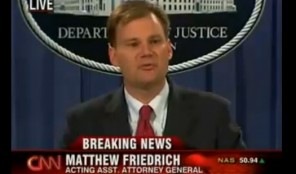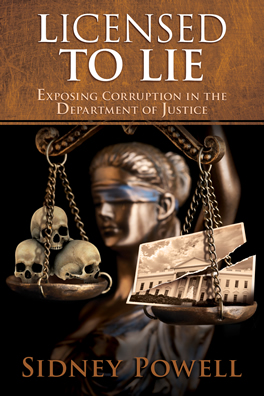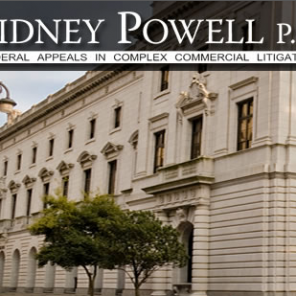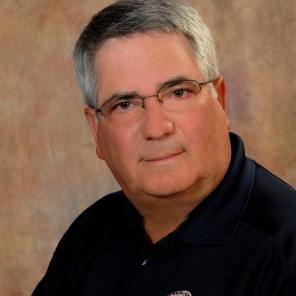TEXAS BAR LEARNED NOTHING FROM MICHAEL MORTON INJUSTICE

It has been well publicized that just as Michael Morton has finally achieved exoneration after 25 years in prison for a murder that he did not commit, the prosecutor in his case, Ken Anderson, is faces the possibility of jail time of his own for tampering with evidence and refusing to obey court orders to turn over evidence favorable to the defense.
One would think that the State Bar of Texas would now take seriously well-documented charges filed by well-respected attorneys that prosecutors suppressed evidence.
BUT NO! The Texas State Bar has summarily dismissed, without any investigation, serious ethical charges lodged against former Enron Task Force (ETF) prosecutor Matthew Friedrich for similar prosecutorial misconduct.
In a part of the Enron prosecutions known as “The Nigerian Barge Transaction,” Matthew Friedrich and his colleagues on the ETF prosecuted four Merrill Lynch executives in Houston federal court in 2004, alleging that they had assisted Enron in putting together a “parking” or loan transaction that was faked to look like a sale. The prosecutors actually yellow-highlighted the transcript of testimony they knew was favorable to the defense, but when the court ordered the ETF to turn over summaries of the favorable evidence to the defense team, Friedrich and the other prosecutors instead turned over bogus summaries that left the yellow-highlighted material out, or “summarized” it as if it said something different.
To make matters worse, the prosecutors repeatedly took advantage of the fact that the defense was not only unaware of the favorable evidence that had been withheld, but had no other way to obtain it because the prosecutors also made sure that NO witness would speak to the defense. They named many people as “unindicted coconspirators” and threatened to indict anyone who had even breathed near the transaction.
As a result, the ETF prosecutors felt completely safe when they put on hearsay-only witnesses with whom they had made sweet plea deals and completely controlled, and when they repeatedly argued to the jury the exact opposite of what the omitted evidence actually showed.
The Enron Task Force was directed by Andrew Weissmann, who is now Chief Counsel and Deputy Director of the FBI.
Friedrich’s co-counsel in the Nigerian Barges case was Kathryn Ruemmler, now White House Counsel. Ethics complaints have been filed against Weissmann in New York, and against Ruemmler in the District of Columbia. The complaints against Ruemmler and Weissmann are still pending.
The grievance against Matthew Friedrich was some 40 pages long, and contained 17 exhibits. The case was overwhelming that Friedrich—like Ken Anderson in the Michael Morton case—had violated Rule 3.8 of Texas Rules of Professional Conduct, which requires prosecutors to turn over all evidence that is favorable to the defense. It is for the defense team (and then the jury) to determine what to make of the evidence.
It is unethical for prosecutors to stack the deck by making only partial disclosure.
One of the authors of the grievance was former law professor William Hodes, a nationally recognized expert in legal ethics, co-author of a leading treatise on legal ethics (and a contributing editor on this Blog).
It was thus more than a little surprising when the State Bar of Texas, all the way up to the Commission for Lawyer Discipline, dismissed the grievance three times, each time without writing a single word explaining why Rule 3.8 did not apply. That may be because they can’t explain it. The Fifth Circuit Court of Appeals had held that the prosecutors “plainly suppressed” evidence favorable to the defense. That is all Rule 3.8 requires for a violation.
Friedrich, now a member of the David Boies law firm, has quite a history of misconduct; the Nigerian Barges Transaction was only his first game of “keep-away.” He and his deputy Rita Glavin oversaw the indictment and prosecution of former United States Senator Ted Stevens for corruption in 2008. Although Stevens was convicted and narrowly lost his re-election bid a few days later, the prosecution began to unravel when an FBI agent blew the whistle on massive prosecutorial misconduct that included (but was not limited to) hiding of favorable evidence. D.C. federal judge Emmet Sullivan excoriated the prosecutors, appointed a special prosecutor to investigate the DOJ prosecutors, and agreed to dismiss the charges against Stevens.
Returning to Texas, Matthew Friedrich and the Nigerian Barges Transaction, we must ask: Why is the State Bar of Texas protecting Matthew Friedrich? If action is at last being taken against Ken Anderson, why is Matthew Friedrich getting a pass? Rules without remedies and enforcement mean nothing!
How many innocent people have to spend years in prison while the prosecutors who hid the evidence are not only free and prospering, but two of them hold great power? Who will prosecute the prosecutors responsible for destroying lives and imprisoning innocent people?











1 Comment
Saw Sidney Powell on CSpan. Impressive book and important subject. Thank you for the book.